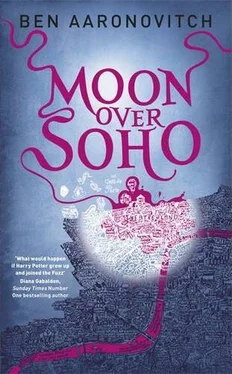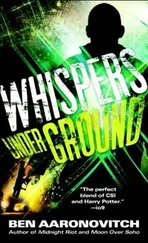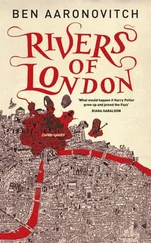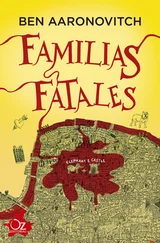Nightingale, despite literally being a relic of a bygone age, had learned to modify his language around me because when I’d looked into the literature the most common terms started with un — unfit, unsuited, undesirable and behind them came the terms starting with sub . However, with a bit of running translation, it was clear that “incomplete” people like Molly were vulnerable to abuse and exploitation by their more powerful supernatural brethren and by practitioners with no moral scruples. Magicians, according to Nightingale, of the blackest hue.
“Sorry. Ethically challenged practitioners,” said Nightingale. “My first ‘governor,’ Inspector Murville, had handled a notorious case in Limehouse in 1911. It involved a famous stage magician working under the name of Manchu the Magnificent who had collected some very strange ‘people’ and was using them to carry out his nefarious plans.”
“And his nefarious plans were what, exactly?” I asked.
“Nothing less than the overthrow of the British Empire itself. Apparently, Inspector Murville, as he set off on his crusade, had it on good authority that Manchu the Magnificent operated an opium den on the Limehouse Causeway. There the yellow devil sat like a fat spider at the center of a web of plots, white slavery being merely the start of it.”
“What’s white slavery when it’s at home?” I asked.
Nightingale had to think about it a bit but apparently when he was young white slavery mostly referred to the trafficking of white women and children for the purposes of prostitution. The inscrutable Chinese were supposedly behind this dastardly trade in lily-white female flesh. I wondered if part of the outrage came from a guilty conscience. I said as much.
“There were established cases, Peter,” said Nightingale sharply. “Women and children were bought and sold in beastly circumstances and suffered real hardship. I doubt they found the historical irony much comfort.”
Inspector Murville, convinced of the seriousness of the threat, organized a raid with half the available wizards in London and a mob of constables loaned to him by the commissioner. Cue a great deal of banging down doors and shouting of “Hold still, you Oriental devil” and then a certain amount of stunned silence.
“The Great Manchu the Magnificent,” said Nightingale, “was revealed to be a Canadian by the name of Henry Speltz. Although he was married to a Chinese woman with whom he had five daughters, all of whom had acted as his beautiful assistant ‘Li Ping’ at one time or other.”
Nothing was found at the house except for a strange young European girl who lived in the household and worked as a maid. Under caution Speltz told Inspector Murville that the girl, whom nobody in the household had thought to name, had been found cowering in one of his disappearing cabinets at the end of a matinee performance at the Hackney Empire.
I mopped up the last of the onion gravy with the last bit of bread in the basket. Nightingale had left half his pudding untouched. “Are you going to finish that?” I asked.
“Help yourself,” said Nightingale, and I did while he finished the story.
Some things never change and a senior police officer doesn’t organize a costly raid and admit to failure, or violating the Magna Carta, until he’s done his best to convict someone of something. Had Speltz actually been Chinese, things might have gone very hard for him. But in the end he was formally charged with disturbing the peace and let go with a police caution.
“The girl was taken into protective custody,” said Nightingale. “Even old Murville could sense there was something not quite right about her.” He looked quickly toward the doors. “Have you finished?” he asked.
I said I had, and Nightingale grabbed the now empty plate and put it back in front of himself just in time for Molly to come drifting into the dining room, pushing the sweets cart. As she cleared the plates, she gave Nightingale a distinctly suspicious look. But she couldn’t prove anything.
She scowled at us and we smiled back.
“Very nice,” I said.
Molly laid out a custard tart and, with one last suspicious look aimed at me, silently left the dining room.
“What happened to the girl?” I asked as I served up the tart.
“She was brought here and examined,” said Nightingale. “And found to be too abnormal to be fostered …”
“Or put into a workhouse,” I said. Under a thick layer of nutmeg, the custard was just as good as that of the Patisserie Valerie. I wondered if I could smuggle some out for Simone. Or, better yet, smuggle her in for dinner.
“It may put your mind at rest to know that we had an agreement with Corum’s Foundling Hospital,” said Nightingale. “She would have been placed there but for the unfortunate fact that once allowed into the Folly, she would not allow herself to be taken out.”
From under the table I could hear Toby looking for the last of the leftovers.
“This is Molly we’re talking about,” I said.
“So she slept in the scullery and was raised by the staff,” he said.
I helped myself to another piece of tart.
“Postmartin was right,” said Nightingale. “I let myself get too comfortable. And while I lived here with Molly the world continued on without me.”
I WAS stuffed, but I forced myself over to the coach house to do some data entry. Once there I was irresistibly drawn to the sofa and Arsenal v. Tottenham . It was going badly for Spurs when my phone rang and a strange voice said, “Hello, Peter.”
I checked the caller ID. “Is that you, Leslie?”
I heard a rasping breathy sound. “No,” said Leslie. “It’s Darth Vader.”
I laughed. I didn’t mean to, but I couldn’t help myself.
“It’s better than Stephen Hawking,” she said. It sounded like she was trying to talk with a plastic bottle in her mouth, and I got the strong impression that it was painful to do.
“You were in London for an operation,” I said. “You could have told me.”
“They didn’t know if it would work,” she said.
“Did it?”
“I’m talking, aren’t I,” said Leslie. “It bloody hurts, though.”
“Want to go back to text?”
“No,” she said. “Sick of typing. Have you checked your cases on HOLMES yet?”
“Not yet,” I said. “I’ve been doing door-to-door.”
“I went through the records that you sent over and Professor Geoffrey Wheatcroft didn’t ever formally teach Jason Dunlop but Dunlop did dedicate his first novel ‘For master Geoffrey from whom I gained my true education.’ Isn’t that what you trainee wizards call your teachers?”
Not this apprentice. But master doesn’t mean the same thing to white boys at Oxford. Given the books in Dunlop’s flat it had to mean, barring a really bizarre set of coincidences, that Geoffrey Wheatcroft had taught Dunlop formal Newtonian magic.
I said as much to Leslie.
“Thought so,” she said. “Question is, was he the only one? And if he wasn’t how do we find out.”
“We need to check the Murder Team’s files and see if known associates or nominals track back to Magdalen College around the time he was there.”
“I love it when you talk dirty,” she said. “It makes you sound like a real copper.”
“Do you think you can do that?” I asked.
“Why not?” she said. “It’s not as if I have anything better to do. When are you coming up to see me?”
“Soon as I get a chance,” I said — lying.
“I’ve got to go,” she said. “I’m not supposed to talk too much.”
“You take care,” I said.
“You too,” she said and hung up.
How many apprentices could one master teach? You needed a trained wizard to act as what Nightingale called an exemplar, to demonstrate the form. But I didn’t see why you couldn’t do that with more than one person at a time. It would depend on how motivated your students were. At somewhere like Nightingale’s old school you’d be dealing with your usual range of talent and enthusiasm. But university students learning magic for fun? Nightingale said it took ten years to be a proper wizard, but I’d managed to do quite a lot of damage within three months of starting training — I didn’t think Jason Dunlop, or any fellow students, would be any different.
Читать дальше












